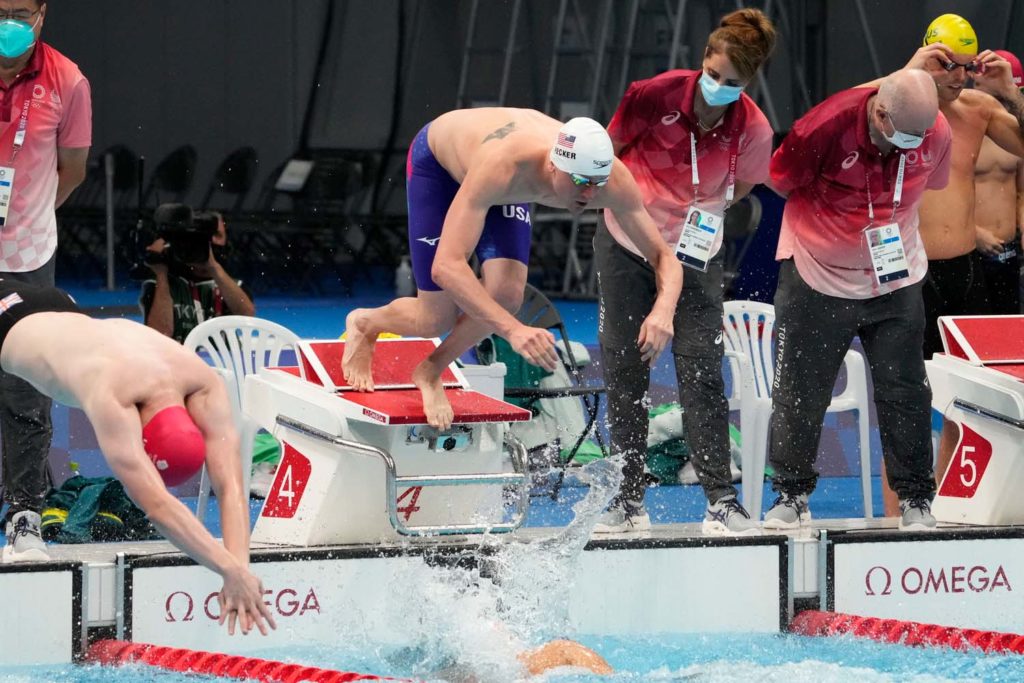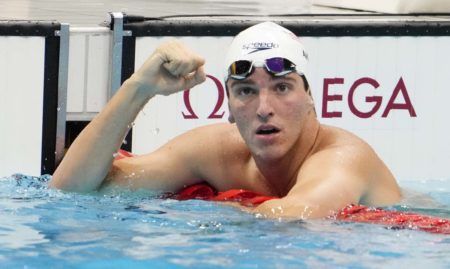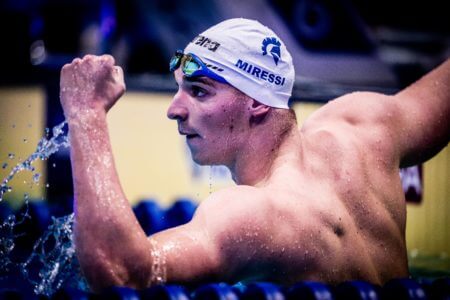Olympics: Prelims-Leading Italians, Dressel-Led Americans and Outside Smoke Russians to Battle for Gold in Men’s 400 Freestyle Relay

Editorial content for the 2021 Tokyo Olympic Games coverage is sponsored by GMX7.
See full event coverage. Follow GMX7 on Instagram at @GMX7training #gmx7

Olympics: Prelims-Leading Italians, Dressel-Led Americans and Outside Smoke Russians to Battle for Gold in Men’s 400 Freestyle Relay
Prior to the 2000 Olympics, the American men were undefeated in Olympic competition in the men’s 400 freestyle relay. But since then, every time we have seen this event on the Olympic stage, the drama has been ramped up.
In 2000, after American Gary Hall Jr. said his team would “smash (the Australians) like guitars,” an Australian group led by Michael Klim and Ian Thorpe touched out the Americans, then strummed air guitars on the pool deck in celebration. Four years later, the Americans fell to a very disappointing bronze medal as South Africa swam away with the gold medal. But 2008 brought Jason Lezak’s memorable and historic comeback against France on the anchor leg (in a split that remains history’s fastest), but the French team turned the tables four years later as Yannick Agnel came from behind to pass Ryan Lochte on the last leg.
Finally, an American group won by almost a second in 2016—a huge margin in this race—with veterans Michael Phelps and Nathan Adrian combining with young swimmers Caeleb Dressel and Ryan Held.
In 2021, Dressel is back, now as the consensus best swimmer in the world and favorite for individual gold in the 100 free, and the Americans have captured two straight world titles in the event since Rio, but there will be drama in this battle for gold. It’s the 400 free relay. Would you expect anything different?

Zach Apple swam the anchor leg for the U.S. men in the 400 freestyle relay prelims — Photo Courtesy: Rob Schumacher — USA Today Sports
The Americans posted a solid effort in prelims as they qualified second in 3:11.33, just over a second behind Italy. Brooks Curry was off his Olympic Trials form on the leadoff leg as he touched in 48.84, but Blake Pieroni (47.71), Bowe Becker (47.59) and Zach Apple (47.19) all swam impressive legs.
That trio should join Dressel, who swam a 47.39 to win the 100 free at Olympic Trials and ranks third all-time in the 100 free at 46.96. Pieroni and Apple should each have a little more in the tank, and that should lead to a final time in the 3:09 range for the Americans in the final, although maybe not as quick as the scintillating 3:09.06 they swam at the 2019 World Championships.
Will that be enough for gold? We don’t know. A lot depends on the Russian Olympic Committee, considered a slight favorite on paper prior to the Olympics, but the Russians barely got into the final, squeezing into eighth place by 0.04 over Great Britain.
How was it such a close call? Because Aleksandr Shchegolev anchored in a slow 49.13. He will undoubtedly come off the squad for the final, with world No. 2 Kliment Kolesnikov coming in. Kolesnikov has been a 47.31 this year, and Evgeny Rylov could also join the squad to replace Vladimir Morozov, who was a little slower than his standard with his 48.13 split in prelims.
Russia should keep Vladislav Grinev, who led off in 48.39, and Andrei Minakov, who split 47.48, on their team for the final. Both are capable of faster if they are at their best.

Alessandro Miressi led off for Italy in the men’s 400 freestyle relay prelims — Photo Courtesy: Mine Kasapoglu / ISL
Italy, meanwhile, had a brilliant performance in prelims as that foursome stormed to a 3:10.29 top qualifying time. Alessandro Miressi led off in 47.46, just 0.01 off his season-best time of 47.45 that ranks fourth in the world, and he was followed by Santo Condorelli (47.90), Lorenzo Zazzeri (47.29) and Manuel Frigo (47.64). Even with the relay starts, Zazzeri and Frigo both swam more than a second faster than their season-best times this year, so it might be tough for them to go much faster. Condorelli has been 48.49 this year, so his 47.90 split was not a huge jump, but Italy can still add Thomas Ceccon for the final.
Ceccon skipped the morning relay to focus on the 100 back, and he qualified second for semifinals in 52.49, well under his seed time of 52.84. Ceccon has swum as quick as 48.14 in the 100 free this year, so he could be capable of up to a 47.3 split in the final.
So let’s break down the race between the U.S., Russia and Italy, even if the Russians will swim in lane eight, nowhere close to Italy and the U.S. in lanes four and five, respectively. These composites will use rolling-start splits from expected returning swimmers in the final, flat-start best times this year for Dressel, Kolesnikov and Miressi, Grinev’s best relay split this year (a 47.49 from the European Championships) and Rylov’s 47.02 anchor leg from the 2019 World Championships. Ceccon will be penciled in at 47.30.
Russian Olympic Committee: Kolesnikov 47.31 + Grinev 47.49 + Minakov 47.48 + Rylov 47.02 = 3:09.33
Italy: Miressi 47.45 + Zazzeri 47.29 + Frigo 47.64 + Ceccon 47.30 = 3:09.68
United States: Dressel 47.39 + Pieroni 47.71 + Becker 47.59 + Apple 47.19 = 3:09.88
Who else could be in the mix? Maybe Australia, which saw defending 100 free gold medalist Kyle Chalmers anchor in 46.63 in prelims. Cameron McEvoy led off in a sluggish 49.18, and he has a season best of 48.49, and they still have to add Matthew Temple and his 48.32 split. But it’s tough to see the Australians dropping more than a second from their 3:11.89 prelims time.
But remember, this is all on paper. If we learned anything from day one in Tokyo, it’s that what we think will happen based on pre-race statistics does not translate in the crucible of an Olympic final, particularly not with the switch to morning finals for these Games. We don’t know exactly how each swimmer will perform on a given day, and team momentum is a huge factor.
Can Italy ride the prelims scorcher to an even quicker swim at night? Can the Americans ride the momentum of their best-ever day one at an Olympics? And can the Russians overcome the close call in prelims and be back in top form for the final, even while they are swimming in lane eight?
In a few hours, the world will find out. The men’s 400 free relay could never, ever set up as a straightforward, clear-cut affair, and the Tokyo final should be yet another cutthroat affair.





Biting my nails in nervous anticipation after reading this. Thanks David!